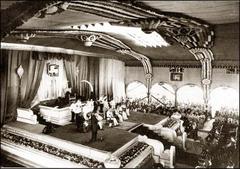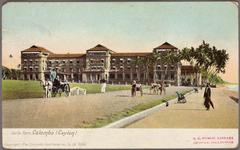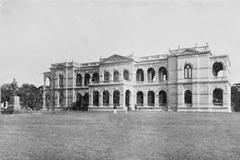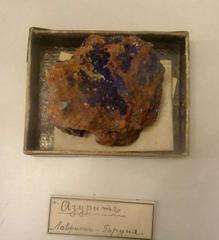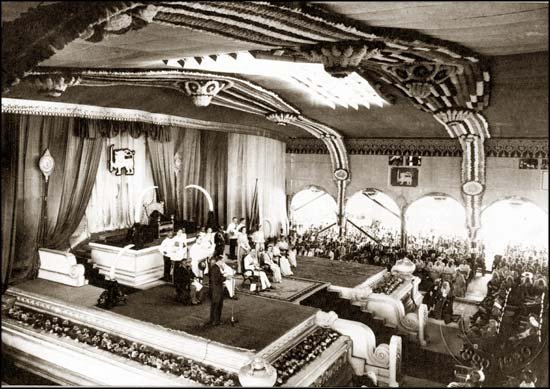
Independence Memorial Hall Colombo: Visiting Hours, Tickets, and Historical Significance
Date: 15/06/2025
Introduction
Independence Memorial Hall in Colombo stands as a proud symbol of Sri Lanka’s hard-won sovereignty and national identity. Located in the prestigious Cinnamon Gardens district, this iconic monument commemorates Sri Lanka’s independence from British colonial rule on February 4, 1948. Designed to evoke the grandeur of the Magul Maduwa (Royal Audience Hall) of the Kandyan Kingdom, the Hall not only honors the nation’s liberation struggle but also serves as a vibrant hub for civic life, cultural events, and national celebrations. Whether you are a history enthusiast, a cultural explorer, or a casual traveler, this guide provides detailed information on visiting hours, ticketing, accessibility, architectural features, and practical travel tips to help you fully appreciate this significant Colombo landmark.
Table of Contents
- Introduction
- Historical Background and Cultural Significance
- Architectural Features and Symbolism
- Visitor Information
- What to See and Do
- Visitor Etiquette and Safety
- Nearby Attractions
- Travel Tips
- Preservation and Modern Usage
- Frequently Asked Questions (FAQ)
- Conclusion
- References
Historical Background and Cultural Significance
The Independence Memorial Hall was conceived in the aftermath of Sri Lanka’s independence from British rule. The government sought to create a monument that would both honor the historic achievement of February 4, 1948, and inspire future generations (Lanka Pradeepa). The chosen site—Independence Square—holds historical weight as it was where the first Parliament of Ceylon was inaugurated, marking the formal transfer of power from the British Crown.
Commissioned by Prime Minister D. S. Senanayake and overseen by Sir John Kothalawala, the project aimed to embody Sri Lanka’s unity, resilience, and rich cultural heritage (Amazing Lanka). The Hall is central to annual Independence Day celebrations and state functions, reinforcing its role as a living monument to national pride (Unique Sri Lanka; Wikipedia).
Architectural Features and Symbolism
Design Inspiration
The Hall’s architecture draws heavily from the Magul Maduwa, the Royal Audience Hall of the Kandyan Kingdom, the last native monarchy before colonial rule (Sri Lanka Travel Guide; The Sri Lanka). This connection invokes indigenous sovereignty and cultural continuity, with the structure featuring:
- Open pavilion layout supported by 60 stone columns adorned with Sinhalese motifs
- Four Pun-kalasas (pots of plenty) at the corners, symbolizing prosperity (Lanka Pradeepa)
- Lion statues modeled after those from the Yapahuwa fortress, representing strength and heritage (Amazing Lanka)
Materials and Craftsmanship
Traditional craftsmanship blends with modern engineering:
- Granite columns and base with hand-carved decorative patterns
- Terracotta tiled roof with timber beams inspired by Kandyan construction
- Polished stone flooring for durability and local character
- Bronze statue of D. S. Senanayake as a focal point
Integration with Landscape
Set within manicured lawns and tree-lined avenues of Independence Square, the Hall’s open design blurs the lines between interior and exterior. Ceremonial avenues are flanked by lion statues, and indigenous plants create a tranquil environment (Lonely Planet).
Lighting and Nighttime Ambience
Natural daylight floods the hall, while subtle spotlights at night highlight its architectural details, creating a dramatic city landmark (Visit Colombo).
Visitor Information
Location and Accessibility
- Address: Independence Square, Colombo 7, Cinnamon Gardens
- Accessibility: Ramps and paved walkways make the site wheelchair accessible. Ample parking is available nearby (Wonders of Ceylon).
Visiting Hours and Ticket Details
- Monument: Open 24/7, year-round. Free entry (Trawell.in; Wonders of Ceylon).
- Museum (Basement): Open 9:00 AM – 5:00 PM (closed Sundays, Mondays, and public holidays).
- Locals: LKR 10 (adults), LKR 5 (children)
- Foreigners: LKR 300 (adults), LKR 150 (children) (Trawell.in)
Facilities and Amenities
- Restrooms adjacent to the hall and park
- Seating and Lawns for relaxation and family outings
- Shopping and Dining: Independence Arcade nearby offers cafes, restaurants, and shopping (TravelTriangle)
- Accessibility: Most of the site is accessible, though some assistance may be needed for the museum basement
What to See and Do
- Explore the Monument: Admire traditional architecture, carved pillars, and lion statues (Wonders of Ceylon)
- Visit the Museum: Discover artifacts, documents, and personal items of independence leaders
- Statue of D. S. Senanayake: Pay respects at the statue of the first Prime Minister
- Enjoy the Park: Stroll through green lawns and walking paths
- Photography: The hall’s design and surroundings make for beautiful photos, especially early or late in the day
Visitor Etiquette and Safety
- Maintain respectful behavior—avoid loud noise or climbing on statues
- Dress modestly, especially when visiting the museum or during cultural events
- The area is generally safe with regular security presence, but remain vigilant with personal belongings
Nearby Attractions
- Independence Arcade: Shopping and dining in a renovated colonial building (TravelTriangle)
- Viharamahadevi Park: Colombo’s largest public park
- National Museum of Colombo: Largest collection of Sri Lankan history and artifacts
- Gangaramaya Temple: Significant Buddhist temple with eclectic architecture
Travel Tips
- Best Time to Visit: December to April for pleasant weather; early mornings for fewer crowds (Laure Wanders)
- Guided Tours: Available via local operators for deeper historical insights
- Combine with Nearby Attractions: Allocate 1–2 hours for the Hall and museum; explore nearby cultural sites
- Stay Hydrated: Bring water and sun protection
- Souvenirs: Available at the Arcade and city markets
Preservation and Modern Usage
Ongoing conservation ensures the Hall’s architectural integrity, with restoration of stonework, timber, and lighting. The Hall remains a venue for state functions, public ceremonies, and community gatherings, reinforcing its role as a living monument (Daily News Sri Lanka).
Frequently Asked Questions (FAQ)
Q: What are the Independence Memorial Hall visiting hours?
A: The monument is open 24/7. The museum is open 9:00 AM–5:00 PM, closed Sundays, Mondays, and public holidays.
Q: Is there an entry fee?
A: Entry to the Hall is free. The museum charges LKR 10 (locals) and LKR 300 (foreigners).
Q: Are guided tours available?
A: Yes, via local tour operators or museums.
Q: Is the site wheelchair accessible?
A: The monument is accessible; some assistance may be needed for the museum.
Q: Can I take photographs?
A: Yes, photography is allowed outdoors and typically permitted indoors; observe any restrictions.
Conclusion
Independence Memorial Hall is more than a historical monument; it is a living symbol of Sri Lanka’s unity, resilience, and enduring spirit. Its grand architecture, educational museum, and central location make it a must-visit destination for anyone interested in Sri Lanka’s past and present. Plan your visit around the Hall’s visiting hours, enjoy the serene surroundings, and explore the rich cultural fabric of Colombo.
For a richer experience, consider using the Audiala app for guided tours and travel tips, and follow us on social media for updates and inspiration.
